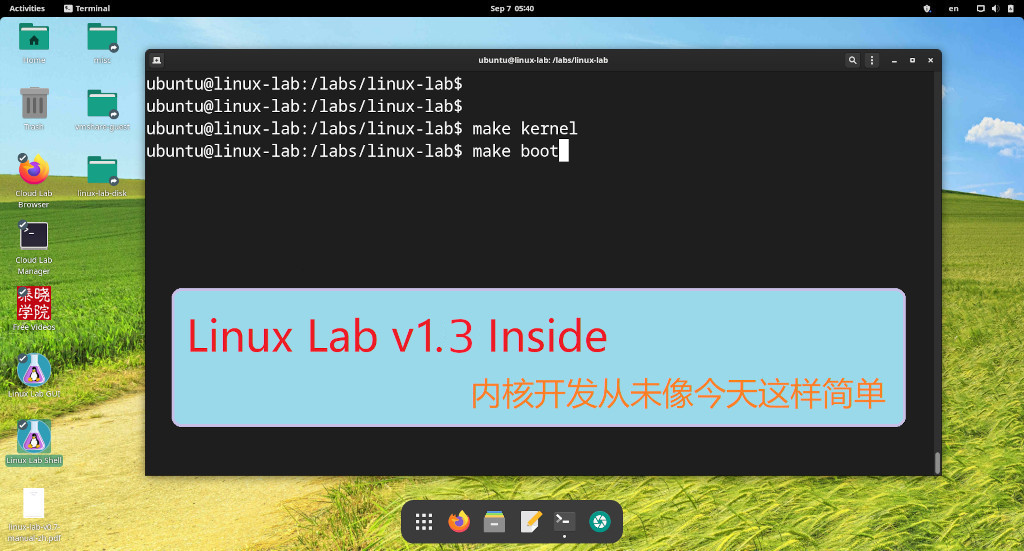[置顶] 泰晓 RISC-V 实验箱,配套 30+ 讲嵌入式 Linux 系统开发公开课
泰晓资讯·12 月 / 第一期 / 2022
“泰晓资讯”,广泛报道 “Linux/开源” 业界资讯。欢迎广大读者投递相关资讯来源和素材,本站将进一步收集整理后发布给大家。
Linux 内核最新消息
https://lkml.org/lkml/2022/11/27/278
Linus Torvalds 本周发布了 Linux 6.1-rc7,现在预计在 Linux 6.1 正式发布之前,我们还会看到一个候选版本。
Linux 6.1 在 rc7 周期中的变化有所增加,而不是 Torvalds 更喜欢看到的变化减少。在过去的几周里,他一直在犹豫是否要为 v6.1 再延长一周。就目前而言,他倾向于在下周再发布一个 Linux 6.1-rc8,争取多一个礼拜的测试后再发布稳定的 Linux 6.1 内核。如此看来,Linux 6.1 稳定版将于 12 月 11 日发布。
在本周合入的许多问题修复中,值得注意一点的是现在可以通过切换 AMD P-State 驱动程序来替换掉 ACPI CPUFreq,详情可以参考 “Linux 6.1-rc7 Makes It Easier To Manage The AMD P-State Driver”: https://www.phoronix.com/news/Linux-6.1-rc7-Easier-AMD-Pstate。
https://www.kernel.org/ updated by 2022/12/1
| 分支类型 | 版本 | 发布时间 |
|---|---|---|
| mainline | 6.1-rc7 | 2022-11-27 |
| stable | 6.0.10 | 2022-11-26 |
| longterm | 5.15.80 | 2022-11-26 |
| longterm | 5.10.156 | 2022-11-25 |
| longterm | 5.4.225 | 2022-11-25 |
| longterm | 4.19.267 | 2022-11-25 |
| longterm | 4.14.300 | 2022-11-25 |
| longterm | 4.9.334 | 2022-11-25 |
| linux-next | next-20221201 | 2022-12-01 |
关键词: Linux
Linux 6.2 正在引入 Compute Accelerator 子系统
It’s happening: the new “accel” compute accelerator subsystem is now queued for introduction with the Linux 6.2 kernel once that merge window opens in December.
一件正在发生的事情是:新的名为 “accel” 的 Compute Accelerator 子系统现在已经在排队等待,一旦合并窗口在 12 月打开,将很快被合入 Linux 6.2 内核。
自社区开发人员达成共识,在现有的 Direct Rendering Manager(DRM)子系统的基础上构建该子系统以来,社区开发人员又在这个用于 AI 加速器的子系统上做了很多工作。由于这些 AI 加速器与 GPU 有很多共同点,因此尽可能多地重用现有基础设施是有意义的。
来自 Intel / Habana 实验室的 Oded Gabbay 一直在设计该子系统和开发其初始框架。目前在 char/misc 目录下的 “habanalabs” AI 驱动程序将被适配为基于这个子系统开发。除此之外,还有其他几个处于开发阶段的 AI 相关的硬件驱动程序正在基于此子系统进行编码,而不是直接基于 char/misc 或 DRM 本身。这些驱动程序预计要到 6.2 之后才会出现,而至少这个子系统和框架现在正在试图进入内核主线,以简化这些硬件驱动程序的引入。
Accelerator 子系统代码目前还只是被合并到 DRM-Next 分支。但这意味着一旦 6.2 的 merge window 被打开,它将随 DRM-Next 一起被合入 Linux 6.2,除非 Linus Torvalds 在最后一刻提出反对意见。
新闻出处,“Compute Accelerator Subsystem Being Introduced For Linux 6.2”: https://www.phoronix.com/news/Linux-6.2-Compute-Next。
关键词: Linux, Compute Accelerator
一个实验性的补丁允许通过 eBPF 扩展 Linux 内核的调度程序
A set of “request for comments” patches posted today to the Linux kernel mailing list implement support for CPU scheduler policies to be implemented as (e)BPF programs.
今天发布到 Linux 内核邮件列表的一组 “RFC” 补丁实现了对 CPU 调度程序策略的支持,这些策略将作为 (e)BPF 程序实现。
在 Linux 内核中我们已经看到 (e)BPF 不断被内核的不同领域所采用。eBPF 即将增加的一个功能是将 eBPF 支持引入 HID 子系统,以便更及时地更好地处理古怪的硬件,并希望减少冗余的驱动程序。
Tejun Heo 今天宣布了基于 eBPF 的调度器工作,作为他和其他几位内核开发人员工作的一部分。人们相信,通过对 Linux 内核调度程序增加 eBPF 支持,它可以简化新调度策略的实验和探索,允许通过加载自定义 BPF 程序来使用特定于应用程序的调度程序和其他可自定义的选项,并提供一种在实际生产环境中实时更改调度策略的方法。
据悉来自 Google 和 Meta(Facebook)的工程师都是这一 RFC 的幕后推手。正如补丁上的描述所写:
“Both Meta and Google have experimented quite a lot with schedulers in the last several years. Google has benchmarked various workloads using user space scheduling, and have achieved performance wins by trading off generality for application specific needs. At Meta, we have not yet deployed sched_ext on any production workloads, though our preliminary experiments indicate that sched_ext would provide significant performance wins when deployed at scale. If successfully upstreamed, we expect to leverage it extensively to run various experiments and develop customized schedulers for a number of critical workloads.
In closing, both Meta and Google believe that sched_ext will significantly evolve how the broader community explores the scheduling problem space, empowering continued improvement to the in-kernel scheduler, while also enabling targeted policies for custom applications. We’ll be able to experiment easier and faster, explore uncharted areas, and deploy emergency scheduler changes when necessary. The same applies to anyone who wants to work on the scheduler, including academia and specialized industries. sched_ext will push forward the state of the art when it comes to scheduling and performance in Linux.”
作为目前补丁的一部分,除了在 eBPF 调度程序基础架构上工作之外,还有一个示例调度程序,它显示了如何在用户空间实现调度决策。另一个演示调度器是一种混合方法,其中负载平衡决策在用户空间中做出,代码是用 Rust 编程语言编写的。更多详细介绍参考补丁: https://lore.kernel.org/lkml/20221130082313.3241517-1-tj@kernel.org/。
新闻出处,“Experimental Patches Allow eBPF To Extend The Linux Kernel’s Scheduler”: https://www.phoronix.com/news/RFC-eBPF-Linux-Scheduler。
关键词: Linux,eBPF,调度
Linux 6.2 将加入对 Apple M1 Pro/Max/Ultra 硬件的支持
Since last year when building the Linux kernel using LLVM’s Clang compiler it’s been possible to enable link-time optimizations (LTO) for the kernel build. Building the Linux kernel with GCC has lacked LTO support while a patch series posted today is the latest attempt to make that happen.
自去年以来,使用 LLVM 的 Clang 构建 Linux 内核时,可以为内核构建启用 Link-Time Optimizations (LTO)。但在使用 GCC 构建 Linux 内核时缺乏 LTO 支持,而最近发布的补丁系列是对实现这一目标的最新尝试。
自从 Linux 5.16 以来,Clang 的 LTO 支持就开始被加入 Linux 内核中,除了用于优化性能外,该特性对于内核基于 Clang 的 CFI 支持也是必需的。
早在 Clang 能够构建主线 Linux 内核之前十年,Linux 内核就有 GCC LTO 补丁,但一直未被合并。Linus Torvalds 当时也表示,他不信任内核 LTO。但是现在,随着我们接近 2022 年底,对内核的 GCC LTO 支持终于有了新的尝试。
来自 SUSE 的 Jiri Slaby 将这个 GCC LTO 支持补丁系列作为 “first call for comments”,部分基于 Andi Kleen 之前的补丁以及 SUSE 工程师 Martin Liska 的工作。
虽然 LTO 通常有利于性能,因为在链接阶段考虑整个程序代码时能够进行优化,但在 Linux 内核的 GCC LTO 的情况下,至少在内核开发人员进行的最新测试中,他们并没有发现启用 LTO 在性能上有太大的改进。除了测试中可以忽略不计的性能差异之外,他们还发现 LTO 后的内核由于引入了更多的 inlining 而体积变得更大。
新闻出处,“Patches Posted For GCC LTO Optimizing The Linux Kernel”: https://www.phoronix.com/news/GCC-LTO-Linux-2022。
关键词: Linux, GCC,LTO
U-Boot 开始支持 HTTP 和 TCP 下载
The U-Boot open-source bootloader that is widely used for embedded devices has finally landed support for HTTP and TCP along with a basic “wget” implementation for downloading images via HTTP/TCP.
广泛用于嵌入式设备的开源引导加载程序 U-Boot 终于获得了对 HTTP 和 TCP 的支持,并实现了 wget 命令,用于持通过 HTTP/TCP 下载 image 文件。
过去 U-Boot 引导加载程序只支持基于 UDP 的 tftp 或 NFS 方式进行文件传输。然而,在 Linaro 的长期努力下,现在也开始支持 TCP 传输协议,也就是说可以通过 HTTP 下载 image 了。
经过二十轮的修订,对 U-Boot 实现 TCP 支持的补丁代码已经被合并,并添加了基本的应用程序 wget 。U-Boot 上的 wget 命令通过 TCP 从 HTTP 服务器上下载文件到指定的内存地址。这个 wget 实现非常简单,目前只支持端口 80 上的 HTTP 服务器而且还不支持 HTTPS。
在 2022 年即将结束之际,U-Boot 终于可以从 HTTP 服务器下载内核或其他文件了,而不是求助于 NFS 或 TFTP 进行远程加载。这应该助于一些 U-Boot 嵌入式设备的应用部署。该项支持工作持续了五年多。
新闻出处,“U-Boot Finally Lands HTTP & TCP Support For Downloading Images”: https://www.phoronix.com/news/UBoot-HTTP-TCP-wget。
关键词: U-Boot
Coreboot 加入开源固件基金会
Earlier this year the Open-Source Firmware Foundation was created to help advance open firmware development. Today the Coreboot project has officially joined the Open-Source Firmware Foundation.
今年早些时候,开源固件基金会(Open-Source Firmware Foundation)成立,以帮助推进开放固件开发。今天,Coreboot 项目正式加入了开源固件基金会。
开源固件基金会的创始成员是 9elements Cyber Security 和 Mullvad VPN。开源固件基金会是一家位于 Oregon(俄勒冈)州的非营利公司。自成立以来,开源固件基金会一直试图呼吁 Intel 开源 FSP,尽管到目前为止没有成功。今年夏天,LinuxBoot 正式加入了开源固件基金会。现在,Coreboot 项目也正式成为开源固件基金会的一部分。
更多关于开源固件基金会的消息可以访问 https://osfw.foundation/。
新闻出处,“Coreboot Joins The Open-Source Firmware Foundation”: https://www.phoronix.com/news/Coreboot-Open-Source-Firmware。
关键词: Coreboot,Open-Source Firmware Foundation
联系我们
欢迎扫描二维码加微信联系我们:

猜你喜欢:
- 我要投稿:发表原创技术文章,收获福利、挚友与行业影响力
- 泰晓资讯:汇总一周技术趣闻与文章,查看「Linux 资讯」
- 知识星球:独家 Linux 实战经验与技巧,订阅「Linux知识星球」
- 视频频道:泰晓学院,B 站,发布各类 Linux 视频课
- 开源小店:欢迎光临泰晓科技自营店,购物支持泰晓原创
- 技术交流:Linux 用户技术交流微信群,联系微信号:tinylab
| 支付宝打赏 ¥9.68元 | 微信打赏 ¥9.68元 | |
 |  请作者喝杯咖啡吧 |  |
Read Album:
- 泰晓资讯·6 月 / 第一期 / 2025
- 泰晓资讯·5 月 / 第三期 / 2025
- 泰晓资讯·5 月 / 第二期 / 2025
- 泰晓资讯·5 月 / 第一期 / 2025
- 泰晓资讯·4 月 / 第三期 / 2025
Read Related:
Read Latest:
- Linux 699
- Compute Accelerator 1
- eBPF 3
- 调度 3
- GCC 54
- LTO 5
- U-Boot 6
- Coreboot 1
- Open-Source Firmware Foundation 1


